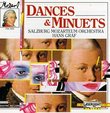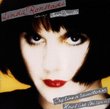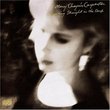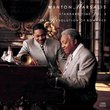| All Artists: Ludwig van Beethoven, Rudolf Serkin Title: Moonlight, Pathetique & Appassionata Sonatas Members Wishing: 0 Total Copies: 3 Label: Sony Release Date: 10/25/1990 Genre: Classical Styles: Forms & Genres, Sonatas, Historical Periods, Classical (c.1770-1830), Romantic (c.1820-1910), Instruments, Keyboard Number of Discs: 1 SwapaCD Credits: 1 UPC: 074643721929 |
Search - Ludwig van Beethoven, Rudolf Serkin :: Moonlight, Pathetique & Appassionata Sonatas
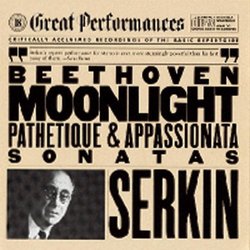 | Ludwig van Beethoven, Rudolf Serkin Moonlight, Pathetique & Appassionata Sonatas Genre: Classical
Rudolf Serkin's early 1960s accounts of the most popular "name" sonatas, on a CBS "Great Performances" mid-price CD, are compellingly direct and offer excellent value. The playing is deliberate, but hardly theatrical: as a... more » ![header=[] body=[This CD is available to be requested as disc only.]](/images/attributes/disc.png?v=15401716) ![header=[] body=[This CD is available to be requested with the disc and back insert.]](/images/attributes/disc_back.png?v=15401716) ![header=[] body=[This CD is available to be requested with the disc and front insert.]](/images/attributes/disc_front.png?v=15401716) ![header=[] body=[This CD is available to be requested with the disc, front and back inserts.]](/images/attributes/disc_front_back.png?v=15401716) |
Larger Image |
CD DetailsSynopsis
Amazon.com essential recording Rudolf Serkin's early 1960s accounts of the most popular "name" sonatas, on a CBS "Great Performances" mid-price CD, are compellingly direct and offer excellent value. The playing is deliberate, but hardly theatrical: as always, the pianist emphasizes the virtues of literalism. The recordings are closely miked and sonorous, and convey good piano tone along with every breath, sigh, groan, and vocalization Serkin produces. The Adagio of the Pathetique is especially lovely. --Ted Libbey Similar CDs
Similarly Requested CDs
|
CD ReviewsThe reviewers who bagged on these recordings are mistaken Christopher Urrutia | Riverside, CA United States | 06/06/2003 (5 out of 5 stars) "I read the reviews which questioned the quality of these recordings. Quite frankly, I don't think I have ever disagreed more with someones critique of a performance. The review that questions Serkins technique in arrpegios etc., is completely off the wall. In fact the opposite can be said. These renditions are perhaps the most perfect technically of any ever rendered. The punishing difficulty of the 3rd movement of the Moonlight is played with complete "risk". There is no holding back so as to keep from making a mistake. Instead he really goes for it, particularly in the final measures which are so often unclear by other pianists. As to the one who wrote that Serkin has no sense of rhythm or meter, he is nuts. Serkin has a broad sense of tempo and rubato. He is a master of playing with time pulling it in and out just as Jascha Heifetz was. By no means does Serkins account of the Appasionata leave you feeling like there is no set meter. Again, the contrary is the truth. This is the most perfect rendition of the Appasionata on record without a doubt. The "passion" is so very, very intense particularly in the final movement. The coda is especially perfect in its tempo, technical execution, and risk taking. So often, in other recordings, I hear wrong notes hit during the final measures of this piece. I understand as a pianist that these measures are extremely difficult in particular because the right hands fast notes are so exposed up in the silver area of the piano. Serkin is completely secure in thses notes. Not a wrong note is to be heard and he plays with such a strong confident tone. It is truely hair raising. I highly recomend this CD to anyone who wishes to hear top notch piano playing." Inspiration from deep within L. | 08/03/2000 (5 out of 5 stars) "My Dad bought me this recording when I took up playing the piano a couple of years ago. As a nine year old, I loved Beethoven's music so much that I got the sheet music of the Pathetique, and am learning to play the first movement, even though my hands can't quite reach a full octive easily. As Dad says: "what has Beethoven got that can grab the soul of today's youth, even with all the distractions of the 21 century?" Listen and find out!" A masterful recording of Beethoven's three greatest sonatas. L. | 05/11/2006 (5 out of 5 stars) "I must take the strongest exception to the review written by Ray Liikanen. Because he personally prefers Barenboim's recording is no reason to leave a one star review. This is one of the finest recordings of these three sonatas in existance, in both technical and interpretive respects. The Appassionata in particular is outstanding, the final coda will leave you breathless; Serkin's expressiveness, power, and technical mastery are second to none. The production of the recording itself my have what some perceive to be flaws, such as the occasionaly audible creak of the bench as Serkin moves, but I find these very human and charming, and far preferable to the sterile pefection of music that sounds as if it were recorded in a vacuum. Serkin also takes exactly the right amount of artistic license with the music, never indulging in excessive histrionics, yet instilling sublime emotion into every note. This recording has the feel of a masterwork: Commanding and confident, yet beautiful and intimate. No praise is too high for Serkin."
|

 Track Listings (9) - Disc #1
Track Listings (9) - Disc #1

